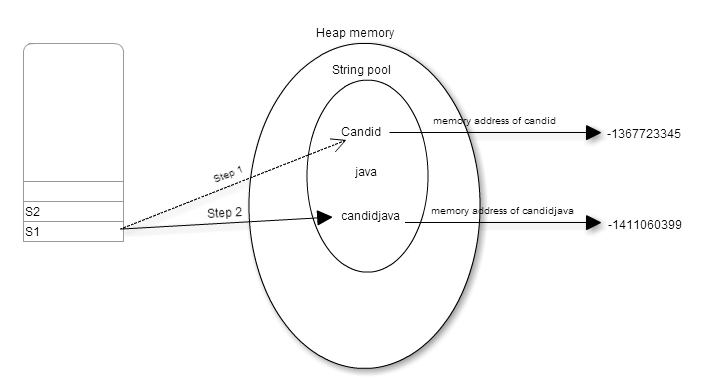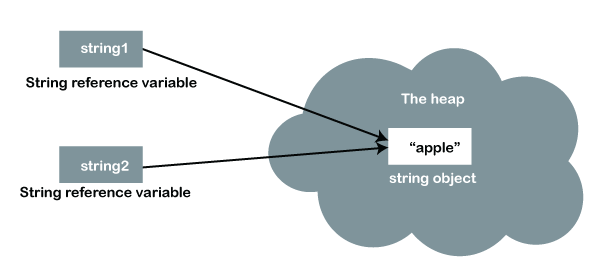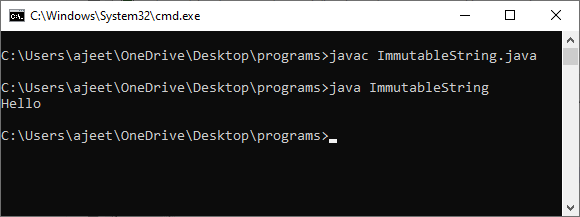What Is Unalterable Strings and Just How It Functions
In the world of programs, comprehending the idea of immutable strings is extremely important for developing robust and protected applications. Immutable strings refer to strings that can not be changed after they are produced, guaranteeing data honesty and predictability within the code. This essential principle plays an important role in numerous programs languages and uses a special method to taking care of information. By checking out the complexities of just how immutable strings function, one can uncover a globe of advantages and opportunities that can elevate the high quality and efficiency of software program growth.
The Essentials of Unalterable Strings
Unalterable strings, as a fundamental concept in programs, are character series that can not be altered when they are created. This implies that as soon as a string is designated a value, that worth can not be altered. In languages like Python and Java, strings are immutable things, leading to different effects in terms of memory management and data stability.
Among the key benefits of immutable strings is that they give a complacency in information manipulation. Since the content of an immutable string can not be modified, it ensures that the initial information stays intact, reducing the threat of unintentional changes throughout program execution (Why are strings immutable in Java?). This property likewise simplifies debugging procedures, as designers can rely on that when a string is defined, its worth will certainly not be inadvertently changed
When a new string is developed based on an existing one, instead than modifying the original string, the brand-new worth is saved separately. Overall, comprehending the fundamentals of immutable strings is critical for understanding shows ideas and maximizing code efficiency.
Benefits of Unalterable Strings
Building upon the safety and effectiveness benefits of immutable strings, their benefits prolong to boosting code reliability and simplifying simultaneous programs tasks. By being unalterable, strings can not be customized after development, which removes the risk of unexpected modifications in the information they store. This integral immutability makes certain that as soon as a string is developed, its worth continues to be consistent throughout the program's implementation, lowering the opportunities of insects brought on by unexpected changes.
Furthermore, unalterable strings add to code reliability by making it easier to reason concerning the state of a program. Since strings can not be changed, developers can rely on that a string will certainly always hold the exact same worth, simplifying debugging and maintenance efforts. This predictability causes extra dependable and secure codebases.

Implementation in Shows Languages
Within various programming languages, the unification of unalterable strings is a fundamental facet that affects just how information is dealt with and adjusted within look what i found code frameworks. The implementation of immutable strings varies throughout various programming languages, with each language supplying its very own devices to support this principle.

In comparison, languages like C and C++ do not have built-in assistance for unalterable strings. Designers in these languages must manually implement immutability by imposing guidelines within their code to stop straight modifications to string items.
Ideal Practices for Functioning With Immutable Strings
When dealing with immutable strings in programming languages like Java and Python, adhering to finest methods guarantees secure and effective data control. Among the essential best practices is to make use of StringBuilder or StringBuffer as opposed to directly controling strings, particularly when managing considerable concatenation operations. These classes provide mutable options for string manipulation, aiding to stay clear of unnecessary memory allocations and boosting performance.
Additionally, when functioning with delicate data such as passwords or API secrets, it is essential to stay clear of keeping them as ordinary message in immutable strings. Making use of secure storage space see this here systems like char varieties or specialized collections for handling delicate details assists minimize security risks associated with unalterable strings.
Real-world Applications and Instances
Exploring practical applications of immutable strings in numerous industries reveals their significant effect on data stability and system reliability. In the health care market, immutable strings play a critical role in ensuring the safety and discretion of individual information. By stopping unapproved adjustments to sensitive info such as clinical records and prescriptions, immutable strings help preserve compliance with rigorous privacy guidelines like HIPAA.
Banks likewise take advantage of the immutable nature of strings to improve the safety and security of client information and transaction documents. Immutable strings aid protect against fraud and unauthorized modifications to monetary information, supplying a durable defense versus cyber risks and making sure the count on and confidence of customers.

Final Thought
Ideal practices for functioning with unalterable strings consist of avoiding straight modifications and using techniques that return new string items. Real-world applications of immutable strings address include information file encryption, caching, and string adjustment tasks.
Immutable strings refer to strings that can not be modified after they are developed, making sure information stability and predictability within the code. When a brand-new string is produced based on an existing one, instead than customizing the initial string, the brand-new value is kept individually.In languages like Java and Python, strings are immutable by default, meaning that once a string things is produced, its value can not be altered - Why are strings immutable in Java?. Best techniques for functioning with unalterable strings include preventing straight adjustments and utilizing techniques that return brand-new string things. Real-world applications of unalterable strings consist of information file encryption, caching, and string control jobs